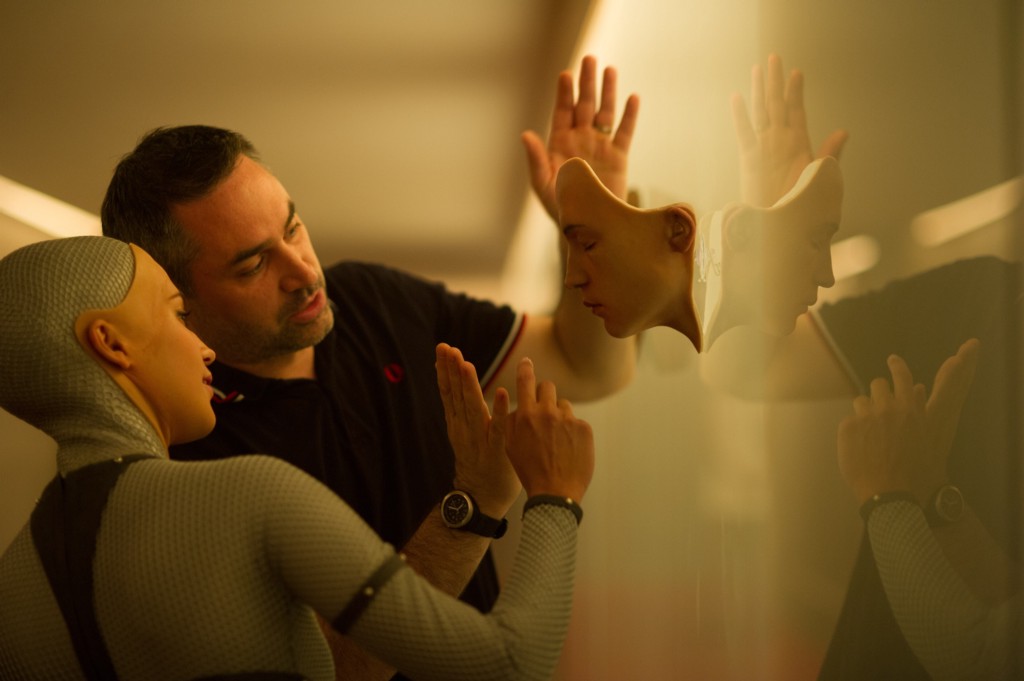The Dudes in the Machine

“I get the ‘moment’ you’re having,” Ex Machina’s wonderfully patronizing search engine potentate Nathan Bateman tells his starstruck employee and guest, Caleb Smith, when they first meet in Bateman’s secret Alaskan lair, a modernist palace hidden in a vast, pristine forest. “But can we just get past that? Can’t we just be two guys, Nathan and Caleb, let the whole employer-employee thing… go?”
But Batemans never intend to let the Calebs forget who’s boss. Ex Machina centers on the mucho macho power tripping of such men, and on the mirror-image power tripping of the beautiful young women to whom they are so inconveniently vulnerable. On the surface, writer and first-time director Alex Garland’s movie is about hubris, power, and control, and though it will be tempting to dismiss Ex Machina as a kind of nihilist Weird Science wallpapered over with intellectual pretensions, Garland also genuinely grapples with ideas about artificial intelligence and technology. And a movie of ideas is somewhat rare in itself lately — plus this one is enchantingly beautiful to look at. This remains true even though Garland’s premises, if you make the mistake of taking them too seriously, will eventually land you in a sterile, well-designed place of total dumbness about everything from the gender wars to the future of robotics to the hive mind. Wheee!
Oscar Isaac, a movie star if there ever was one, is splendid as Bateman, the weirdo Internet CEO genius behind Bluebook (Google, more or less, under a fatuously Wittgenstein-derived name. I mean it is okay I guess to suggest that gathering intelligence about language from the hive mind kind of jibes with Later Wittgenstein? But these self-serious flourishes end up stripping away the veneer of seriousness they’re intended to impart.) Bateman is a “mad scientist” in the classic mold: menacing, charming, with a fantastic frisson of Silicon Valley clueless-rich-bro arrogance; Garland most definitely knows his rich people. Caleb, a hotshot Bluebook programmer, has won a contest to spend a week with the boss. Soon it emerges that Caleb has a job to do: administer the Turing test to a walking, talking sex toy, the luscious, if see-through, Ava. She is half inflatable doll (“you bet she can fuck”) and half mad-science experiment, and Caleb doesn’t even think to question why Nathan made her. She’s an Apple product, and he’s a fanboy:
Nathan: You’re going to be the human component in a Turing test
Caleb: Holy shit!
Nathan: Yeah, that’s right Caleb! You got it! ’Cause if that test is passed, you are dead center at the greatest scientific event in the history of man.
Caleb: If you’ve created a conscious machine, that’s not the history of man. That’s the history of gods.
And yet if Garland poses a set of fascinating questions around the why of it, it’s tangential to the love-and-power triangle presented in the plot: Who of the three will come ex machina, “out of the machine”?
Like Maria in Metropolis and Number Six in Battlestar Galactica — artificial women — the glorified dolls of Ex Machina turn out to be more complicated than anyone (usually men) gave them credit for. Not only might they have their own ideas, they might have their own secrets; not only might they have a will of their own, they might be capable of furthering their own interests. Fun as it can be, this conceit is in no way here advanced even to the point reached by Blade Runner in 1982. Garland means for you to sympathize with Frankenstein’s Fembot, simultaneously condemning her objectification even as he is participating in it — he’s having his cheesecake and eating it too. Evidently the Sensitive Men will be mansplaining forever about how women are more complex — even dangerous! — than they may appear. People respond in an irrationally positive manner to beautiful young girls, you may be surprised to learn. And that makes them even more powerful! Also: Women may not take kindly to being objectified, did you ever think of that?
But where Ex Machina really comes alive is in its scientific ideas: For instance, if an artificial intelligence could be informed by the collective information, thoughts, and emotions of everyone who uses or has ever used the Internet, what would the result be like? There’s a wonderful part where Nathan allows Caleb to examine the “wetware” brain he designed for Ava (a term, by the way, that Garland did not coin. It’s super old!) Where does the software come from that operates this beautiful glowing blue blob, this computer brain that has given Ava consciousness? “Bluebook,” Caleb breathes. That part is so neat! As for the potentially benign AI: after enduring decades of Skynet and variations thereupon, I was so refreshed and captivated by this old-fashioned notion that The Machines might turn out to be noble, after all! Ex Machina proposes, if glancingly, the possibility that an AI might be not only worthy of real love, but also capable of giving it on her own — making it out of whole cloth, as it were. Not even Data could quite do that.
There is one interesting question about all this (given especially that Isaac so closely resembles Garland physically): Bateman feels that his intelligence qualifies him to seize and wield power and control over others — he’s not afraid of Ava or her sexuality, he has a right to dominate her. But, the movie is saying, maybe he should be afraid. What does that say about the quasi-libertarian power-seizing mindset of today’s real technocrats? And what does it say about movie directors?


This is Garland’s debut as a director, the latest achievement in a brilliant and eclectic career that began at age twenty-six with the bestselling debut novel, The Beach, which was made into a film starring Leonardo DiCaprio. He wrote the screenplays for 28 Days Later, Sunshine and the adaptation of Kazuo Ishiguro’s Never Let Me Go. He told the Guardian that he feels more strongly about this film than about anything else he’s done so far. It’s his story, his direction, his designs — it’s an auteur piece from which one comes away with the idea that this auteur wants very much to be “taken seriously.”
In an interview posted last weekend, Garland told the Seattle Post-Intelligencer, “I know it’s not politically correct, but this is true — some people are smarter than others. Now, smart people don’t enslave stupid people. We know that’s wrong. There might be some evil bastards that do try it, but as a rational society we don’t accept that.” These assertions go a long way toward explaining Ex Machina’s deficiencies. If you are willing to believe the blobby, incoherent proposition that “some people are smarter than others,” it will be a lot easier to swallow Garland’s story, with all its improbabilities (and, ultimately, the contradictions of the auteur’s proposition regarding “intelligence.”) The characters are all trying to “outsmart” one another — there’s all this cleverness, as each tries to gain advantages, secret and explicit, over the others — but the real drama takes place in the larger context of the potential costs of our growing reliance on technology, and our own increasing isolation and vulnerability. When you sacrifice human values and contacts to pushing the envelope of technology, and business ambitions, all that cleverness comes at a cost. The familiar Frankenstein story. But now that we can see the real-life means whereby human beings might create life, or something like it, that old story has taken on an entirely new gravity.
Garland comes from a distinguished family — his mother is psychoanalyst Caroline Medawar Garland, and his father the cartoonist Nicholas Garland, illustrator of Barry Humphries’s Barry McKenzie in Private Eye. His grandfather was Sir Peter Brian Medawar, the Nobel-prizewinning zoologist and author. He was kind of the Atul Gawande of his day, only far more eminent — he pretty much founded the whole field of organ transplantation, and as if that weren’t enough, he was a noted disciple of the philosopher Karl Popper, as well as being a handsome, tall, elegant and gloriously witty writer, a popularizer of science whose collected essays, The Threat and the Glory I can recommend unreservedly.
(Interestingly, it was Popper who was threatened with a poker by Wittgenstein at Cambridge in 1946 during an argument over whether or not there are philosophical problems, an episode admirably recounted in the walloping 2001 bestseller, Wittgenstein’s Poker: PLEASE read this book if you haven’t yet.)
In his 1960 Nobel acceptance speech, Medawar talked about biology’s ability to produce altogether new kinds of understanding:
[T]hough our brothers of physics and chemistry may smile to hear me say so[,] biology is now a science in which theories can be devised: theories which lead to predictions and predictions which sometimes turn out to be correct. These facts confirm me in a belief I hold most passionately — that biology is the heir of all the sciences.
In other words, the fundamental problems of biology — its mysteries, if you like — are complexities to be learned from from, not merely to be “solved,” as Garland’s protagonist Nathan Bateman, and all our real techno-utopians, would have us believe. Writing on the Royal Society website, Neil Calver described the chief insight Medawar took from Popper: “recognition that human designs and human schemes of thought are very often mistaken and that the safest way to proceed is to identify and learn from mistakes.” This isn’t the “fail fast” philosophy of today’s Silicon Valley technocrats, but a patient and careful concern with “the safest way to proceed” — a recognition of the value and difficulty in making the progress already made, and a corresponding reluctance to press forward thoughtlessly. That mistakes are all we are made of, and that empirical progress must always and ever depend on that single certainty, is a most valuable insight, but not one you will get from watching Ex Machina.
